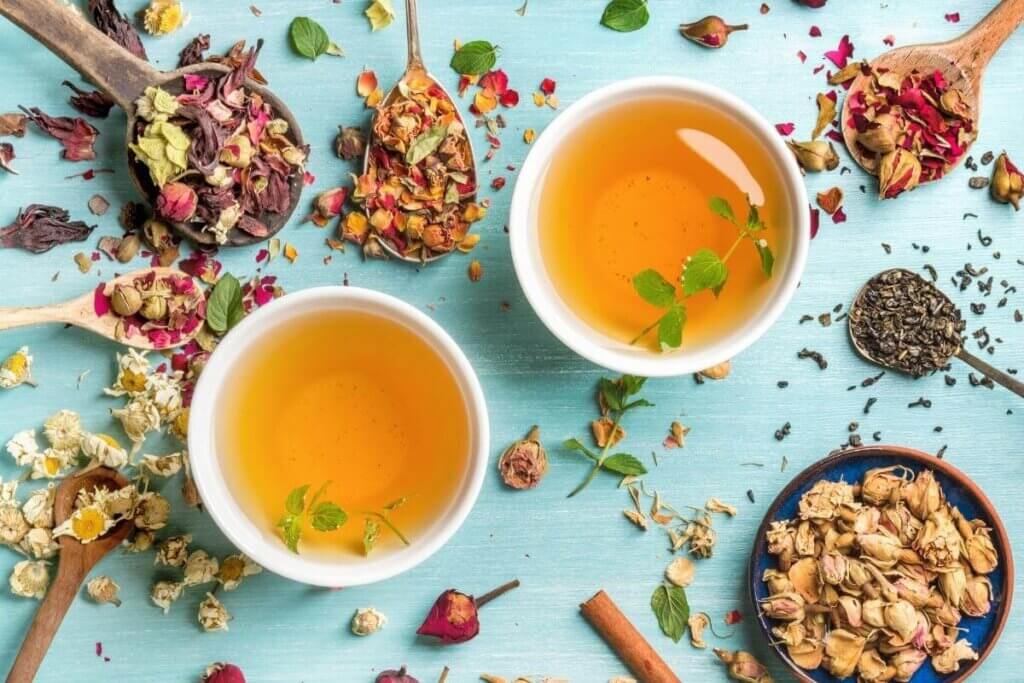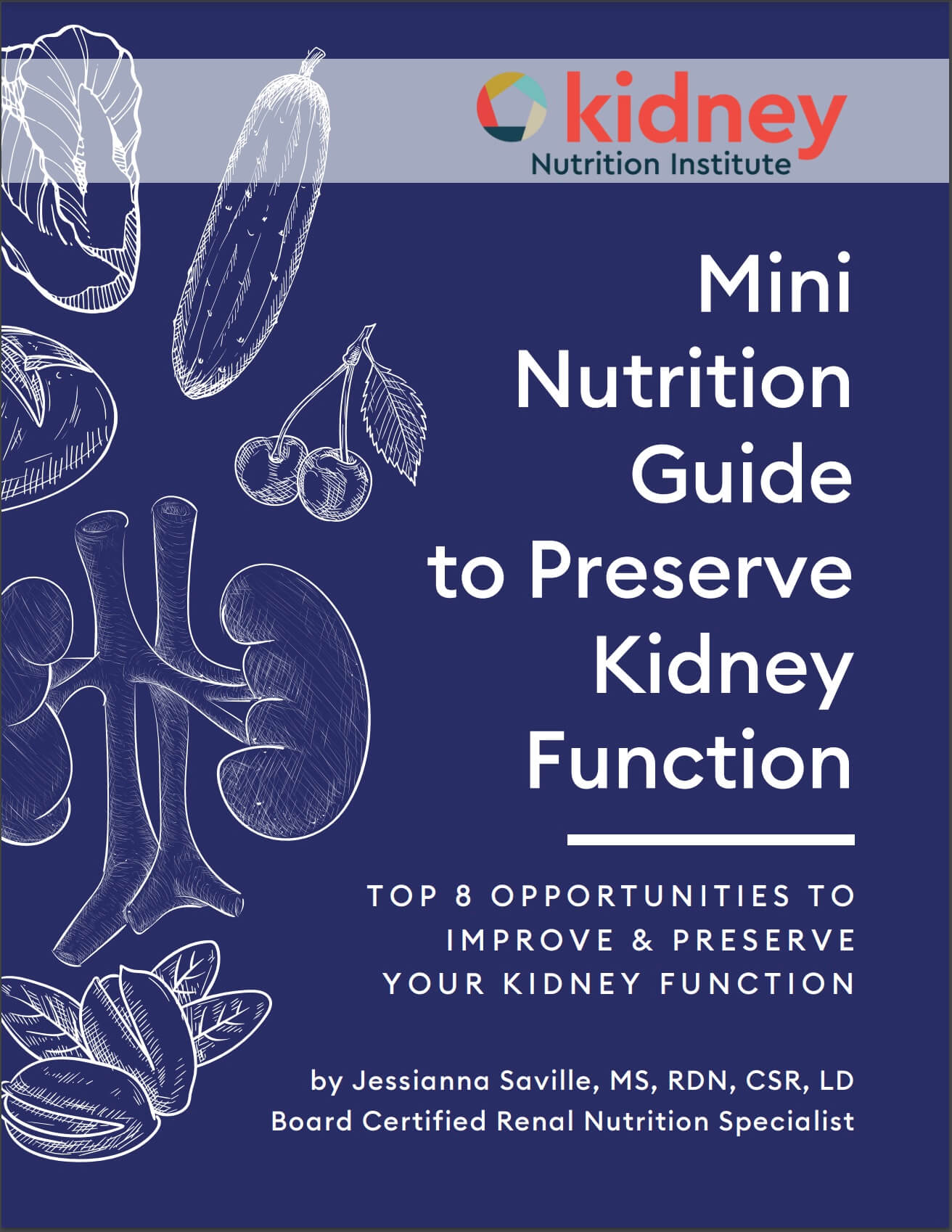There is nothing like a good soothing cup of tea, especially in the cold weather months! But, if you have kidney disease, you might be wondering if certain types of teas can help or harm your kidneys.
We hear this question often, so we’re diving into the different types of teas and any considerations to keep in mind for kidney health!
But first, a little background.

A brief history of tea
Tea is the most widely consumed beverage globally (1), after water, of course! Most tea comes from the leaves of the Camellia Sinensis plant. The variety of teas that come from this plant contain caffeine and includes:
- Black tea
- Green tea
- Oolong tea
- White tea
Herbal teas come from various plants and flowers and typically do not contain caffeine.
The origin of tea dates back to 2750 BC when it is thought that a Chinese emperor was boiling water, and a leaf from the Camellia Sinensis plant accidentally fell in.
Since then, black, oolong, and green tea have been heralded worldwide for their fantastic taste and medicinal properties and have been at the root of many cultural traditions ever since.
Benefits of drinking tea - is tea good for kidneys?
Drinking tea comes with significant benefits! Let’s review a few of the main reasons why tea can promote kidney health.
- Tea counts toward fluid intake and hydration goals. But, unfortunately, most people do not consume enough water throughout the day. A survey of What We Eat in America from 2005-2008 found that people only drink 3.9 cups per day on average.
The amount of fluid recommended for each person (even with kidney disease) is different because each person is unique. In addition, a variety of factors impact fluid needs, including:
- Activity level
- Kidney function
- Medications
- Health conditions
- Temperature/climate
- Body size
Hydration can impact kidney function and the ability to remove waste from the body. However, if you have late-stage kidney disease or certain heart conditions, too much fluid can be a problem.
To clarify your fluid goals and management strategies, talk with your physician or book your free Zoom call with a KNI dietitian today!
- Tea is calorie-free and sugar-free. For individuals striving to lose weight or manage diabetes for kidney health, one of the easiest ways to cut excess calories and sugar is to choose unsweetened calorie-free beverages.
Of course, tea is only calorie-free and sugar-free when there is nothing added. Adding sweetener or cream will add calories and sugar. For some people, adding a bit of milk to black tea can help prevent the formation of kidney stones. More on this later!
- Another fantastic benefit of drinking tea is that it is a rich source of polyphenols. Polyphenols are bioactive properties found in certain plants that provide an antioxidant effect when consumed. Diets rich in polyphenols are linked to a decreased risk of chronic diseases like cardiovascular disease, cancer, and even obesity. (1)
What tea is good for kidney disease?
Now that we know that tea packs many perks, you might be wondering if tea is safe for kidney disease. Let’s break down the different types of tea and review the risks and benefits of each type.
Black tea
Black tea contains caffeine, clocking in at about 50 mg compared to the 95 mg in your average cup of joe. Unfortunately, black tea is also high in oxalates, which can lead to kidney stones.
In fact, the longer you infuse black tea, the higher the oxalate amounts. A 2 minute infusion of 1 teaspoon black tea has 55 mg oxalates, but a 6 minute infusion releases 78 mg of oxalates!
If you are prone to kidney stones, we recommend enjoying your tea with milk. Combining milk with black tea causes the calcium to bind to oxalate in the gut rather than the urinary tract, where it could develop into kidney stones.
One 8 ounce cup of black tea prepared with tap water contains about 90 mg of potassium. Therefore, black tea is considered a low potassium beverage; however, when drinking multiple cups throughout the day, keep in mind that the potassium in tea can add up!
Black tea contains almost no sodium or phosphorus.
KNI verdict: Black tea is a can-do! Be mindful of the oxalates if you have PKD and/or are at risk for kidney stones and that potassium can add up when drinking multiple cups throughout the day.
Green Tea
Green tea contains an even smaller amount of caffeine, about 30 mg for an average 8-ounce cup. There is less potassium in green tea than black tea, and it has no phosphorus and only 2 mg of sodium! Green tea is also considered very low in oxalates, with most brands containing less than 2 mg of oxalates per cup.
Green tea contains a polyphenol called epigallocatechin- 3- gallate (EGCG) that exhibits strong antioxidant properties. Antioxidants help to reduce inflammation and oxidative stress.
These antioxidant properties are essential because inflammation and oxidative stress are two features of CKD. Therefore, green tea could be a potential therapeutic option! EGCG is currently being researched in different diseases of the kidney. (2)
Matcha tea is made from ground green tea leaves and contains more antioxidants than traditional green tea. However, it also contains more caffeine, potassium and oxalates. One teaspoon (2 g) serving of matcha tea powder has 50 mg of potassium and 9 mg of oxalates.
For individuals taking the anti-coagulation medication Warfarin or Coumadin, be aware that green tea contains a small amount of vitamin K. Your team at the coumadin clinic may recommend limiting or avoiding green tea. However, when managing INR, consuming consistent amounts of vitamin K each day is what matters most!
KNI Verdict: Green tea is a kidney friendly tea! It is a low potassium and low caffeine beverage that offers a significant antioxidant boost. Be considerate of oxalate amounts in matcha tea if you have kidney stones or PKD! Use caution if you are taking the blood thinner Coumadin (warfarin).
Oolong tea
Oolong tea gets slightly less press than green and black tea, but it too is made from the Camellia Sinensis plant. The significant difference between the three teas is where the plant is grown and how the leaves are processed.
The taste of oolong tea varies greatly. For example, it can be more robust like a black tea or milder in flavor and color like green tea.
The caffeine content and potassium level fall typically between green and black tea but depends on processing. Plus, it is very low in oxalates and safe if you have PKD.
KNI Verdict: Oolong tea is another kidney friendly tea and offers the same antioxidant benefits as green and black tea! It’s definitely a can-do!
Check out this table to see how each type of tea stacks up against one another.
| Tea | Caffeine | Potassium | Phos | Sodium | Oxalates |
| Black tea, brewed with tap water (8 oz) | 50 mg | 90 mg | 2 mg | 7 mg | 55-78 mg |
| Green tea, brewed with tap water (8 oz) | 29 mg | 20 mg | 0 mg | 2.5 mg | 0-2 mg |
| Oolong tea, brewed with tap water (8 oz) | 35 mg | 26 mg | 2 mg | 6 mg | 1 mg |
White tea
White tea is another tea made from the Camellia Sinensis plant, although it is less popular than black, green, and oolong tea. What makes white tea unique is that the leaves are picked much earlier in the growing season, giving them less time to oxidize.
Therefore, the flavor of white tea is more delicate and floral than black, green, and oolong tea. It is also a very low oxalate choice of tea! However, because it is cultivated early and takes meticulous processing, white tea is usually more expensive.
The caffeine content of white tea can also vary depending on the product and how it was processed, ranging between 6-75 mg per serving. Unfortunately, the potassium content of white tea was tough to track down, and we could not find it in the USDA FoodData central database.
KNI Verdict: White tea is an excellent choice for people with kidney disease! We love that it is less bitter than green and black tea.

Herbal Tea for Kidneys
There is a vast range of herbal teas, from traditional peppermint or chamomile to blends that support immunity or detoxification. The use of herbal tea dates back centuries and remains popular even in this modern era. Plants and herbals are often used for medicinal properties and can be taken in various forms, including tea.
Many people choose herbal tea to help with various conditions like poor digestion, sleep, immunity, or stress. Each type of herbal tea provides unique benefits, but they all have in common that they are caffeine-free, except for Yerba Mate.
Herbal teas come from a variety of plant sources, including:
- Flowers
- Roots
- Fruits
- Leaves
There is a slight difference between herbal tea and herbal infusions. Herbal tea uses fewer herbs than herbal infusions, and the steep time for herbal tea is shorter than for herbal infusions. Therefore, herbal infusions contain more nutritional and medicinal properties than herbal tea.
While there is a technical difference between them, we will refer to herbal infusions and tea, both as tea, in this post.
Safe herbal teas for kidney disease
Many of the most popular herbal teas are safe to drink in moderation if you have kidney disease, including:
- Ginger
- Mint tea (peppermint, spearmint, mint blends)
- Chamomile
- Orange blossom tea
- Teas made from fruits
- Rooibos
However, some herbs used to make teas can interfere with medications, cause a diuretic effect, lower blood sugar, or raise potassium levels and should be used with caution for people with kidney disease.
Herbal teas to use with caution
Only a small amount of herbs or flowers are needed to make tea and in small doses most likely are not potent enough to be a problem. However, we recommend consulting with your physician or renal dietitian first whenever starting any new herbal products or supplements.
In addition, it is essential to monitor for any changes in your health, like blood pressure, blood sugar, and edema, when beginning a new herbal tea.
Let’s review some teas that you may want to use caution with if you have kidney disease. The herbs listed below were researched using the Memorial Sloan Kettering Cancer Center Integrative Medicine database.
Herbal tea that may interact with medications:
- Astragalus
- Black Cohosh
- Chamomile
- Chasteberry
- Dandelion
- Elderberry
- Fenugreek
- Feverfew
- Ginger
- Ginkgo Biloba
- Ginseng
- Green tea
- Goldenseal
- Hibiscus
- Horse Chestnut
- *Licorice root
- Milk Thistle
- Red Clover
- Saw Palmetto
- St. Johns Wort
- Turmeric
Herbal teas that may affect blood pressure/ potassium:
- Astragalus
- Dandelion
- Elderberry
- Hibiscus
- *Licorice root
Herbal teas that may affect blood sugar:
- Elderberry
- Ginger
- *Licorice root
General recommendations when choosing herbal tea
It’s important to know that herbal teas are not regulated for dose, content, or purity. Therefore, when selecting an herbal tea, we recommend looking for a high-quality product that gives clear information about the quality of the ingredients on the label and their brand website.
Be aware that most of the time, adverse reactions to herbal teas occur with excessive use. Therefore, use moderation with any herbal tea.
*Licorice contains glycyrrhizin, a biologically active component that, when metabolized can lead to hypertension and hypokalemia (low potassium levels). (3)
When looking at products that contain licorice, be sure to look for the de-glycyrrhizinated form of licorice (DGL).
DGL is a safe form of licorice that will not cause any change to blood pressure or potassium levels and is used to treat various conditions in functional medicine.
Considerations for diabetes and kidney disease
What is the best tea for diabetes? While there is no direct answer to this, there is research showing that green tea is excellent for diabetes. Thanks to is anti-inflammatory and anti-oxidant properties, it has the potential to protect the kidneys from oxidative stress. It may also improve blood pressure and regulate blood sugars! (4)
If you want to include green tea, there certainly won't be any harm and potentially would be benefits. Ask your dietitian to know the right amounts for you and your health.
There are other herbal teas that may be helpful for diabetes and kidney disease not discussed in this post, so look out for our upcoming posts for more information!
Considerations for PKD
Preventing crystal formation is key to prevent disease progression in PKD. 2 practical ways include: adequate hydration and oxalate management.
- Hydration: consuming adequate fluids is important to prevent crystal formation and drinking something exciting like tea can help.
- Oxalate Management:
- Choose low oxalate teas: green tea, oolong tea, white tea, chamomile tea, fruit tea, peppermint tea, jasmine tea
- Limit high oxalate teas: black tea, English breakfast, and Ceylon tea)
- Pair high oxalate teas with sources of calcium like milk
Check out our article "Manage oxalates and pick more plants for PKD" for more information on oxalates and PKD!
Final thoughts on tea for kidney disease
- Common teas like black, green, oolong, and white tea are great choices for kidney health. However, be mindful that these types of tea that come from the Cammelia Sinensis plant contain caffeine.
- Black tea contains oxalates
- Green tea may interfere with the blood thinner Coumadin (warfarin)
- Many of the common herbal teas are very safe for individuals with CKD- especially when taken in small doses (1-3 cups per day)
- Chamomile
- Mint teas (peppermint, spearmint)
- Ginger
- Orange blossom
- Roobios
- Tea made from fruit
- When purchasing herbal tea, be sure to choose high-quality products that list any warnings or disclaimers on the label and website and information on where the herb was grown.
- Certain types of herbal tea can interfere with medications or cause changes in blood pressure and blood sugar. Most often, this occurs with high doses of herbs.
- If you want clarity on the safety of herbs, talk with your doctor or book your free Zoom call with a KNI dietitian today!
- Always monitor your blood pressure/ blood sugar and watch for any changes in your usual health when beginning anything new. If you notice any changes to your current health or side effects, discontinue use immediately and contact your doctor.
Have more questions about your kidney health?
Join our free monthly class or book an appointment to meet with one of our expert renal dietitians!

